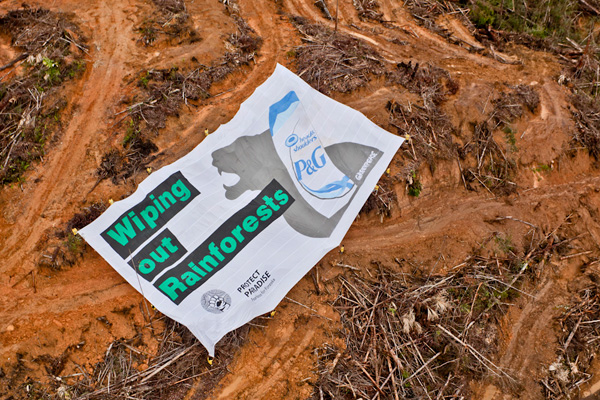
Concession owned by PT Multi Persada Gatramegah (PT MPG), a subsidiary of Musim Mas company, a palm oil supplier to Procter and Gamble in Muara Teweh, North Barito, Central Kalimantan.
Mars, Inc., the maker of M&M’s, Snickers, Twix, and a variety of other food products, has committed to a zero deforestation policy for the palm oil it sources, reports Greenpeace.
The policy pledges Mars to only use palm oil produced legally and without conversion of high conservation value areas, peatlands, or high carbon stock areas like tropical rainforests. It also establishes a “no burn” requirement and sets criteria for labor standards and human rights, including the need for free, prior informed consent from communities that may be affected by new oil palm plantation development.
“We will only work with palm oil suppliers that share our values and our commitment to transforming the palm oil supply chain, and we will require that by the end of 2014 they confirm their commitment to comply with [our] sourcing charter,” the policy states. “These measures will help ensure a genuinely sustainable pipeline where all material is sourced from companies whose mills only produce sustainable palm oil.”
The policy — which follows in the footsteps of safeguards established by Unilever, Nestle, Neste Oil, and Kellogg’s, among others — goes well beyond the palm oil industry’s dominant eco-certification standard run by the Roundtable on Sustainable Palm Oil (RSPO).
“Mars’ policy includes an ambitious timeline of 2015 to remove forest destruction from its supply chain,” said Greenpeace in a statement. “Importantly, the policy recognizes the need to move beyond the Roundtable of Sustainable Palm Oil (RSPO) standards and Consumer Goods Forum (CGF) commitments to break the link between palm oil and deforestation.”
The policy is being implemented with the help of The Forest Trust (TFT), an NGO that is implementing zero deforestation commitments with a dozen palm oil producers and consumers as well as Asia Pulp & Paper, an Indonesian forestry giant.

Greenpeace activists unfurl a giant banner in the middle of orangutan habitat inside the concession owned by PT Multi Persada Gatramegah (PT MPG), a subsidiary of Musim Mas company, a palm oil supplier to Procter and Gamble in Muara Teweh, North Barito, Central Kalimantan. Greenpeace is calling P&G to stop destroying Indonesian rainforest and commit zero deforestation policy.
The development comes as Greenpeace is in the midst of an intense campaign to push Procter & Gamble (P&G) to adopt a similar policy. Last week the group staged an attention-grabbing protest at P&G’s headquarters in Cincinnati, while over the weekend, activists in Indonesia unfurled a giant banner in an oil palm plantation owned by P&G supplier Musim Mas. Greenpeace says P&G’s current policy fails to exclude deforestation from its palm oil supply chain.
“In order to achieve so-called ‘sustainable sourcing of palm oil’ P&G is relying on a certification scheme that has failed to prevent rainforest destruction in the habitat of endangered orangutans, or help reduce man-made fires like the ones that covered Singapore in smog last summer. It’s time P&G finally becomes proud sponsors of rainforests and commits to No Deforestation,” said Areeba Hamid, forest campaigner at Greenpeace International, in a statement.
“As commitments from GAR, Wilmar and the Palm Oil Innovation Group show, palm oil does not need to be linked to forest destruction. RSPO members like Musim Mas must immediately stop laundering dirty palm oil on the global market and commit to No Deforestation.”
Campaigns by Greenpeace, the Rainforest Action Network, the Union of Concerned Scientists, and a number of local NGO’s, zoos, and orangutan conservation groups have helped rapidly shift palm oil sourcing policies over the past four years. The policies have helped persuade two of the world’s largest palm oil companies — Golden Agri Resources and Wilmar, which together represent about 55 percent of the global palm oil market — to adopt zero deforestation commitments. Activists are now targeting Musim Mas and KLK in an effort to get companies representing more than two-thirds of the world’s palm oil supply onboard with zero deforestation policies.
Such commitments have become increasingly important as palm oil’s share in global deforestation has climbed. Today palm oil is the biggest single direct driver of deforestation in Indonesia and Malaysia. Environmentalists fear the crop could soon drive substantial forest loss in West and Central Africa, putting endangered species at further risk.

Greepeace protest on a concession owned by PT Multi Persada Gatramegah in Indonesian Borneo. All photos courtesy of Greenpeace

Crosshairs represent the location of the Multi Persada Gatramegah concession. Courtesy of Global Forest Watch. Click image for interactive map.







